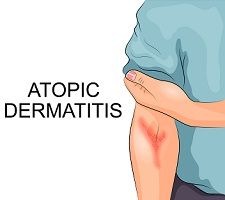Breakthroughs in Atopic Eczema Treatment and Prevention Highlighted in Year-End Reviews
The second of a two-part, year-end review of advances against eczema/dermatitis (AD) focused on treatment and prevention, noting there was little evidence showing "relative efficacy" of common systemic treatments.

The second of a two-part, year-end review of advances against eczema/dermatitis (AD) focused on treatment and prevention, noting—from the findings—that there is little evidence of relative efficacy among commonly used systemic treatments.
Kim Thomas, PhD, professor of Applied Dermatology Research and Co-director of the Centre of Evidence Based Dermatology, University of Nottingham, United Kingdom, and colleagues followed the first part of their summary of systematic reviews—on epidemiology, risk factors, and outcome—to consider the use and evidence for particular treatments and preventative programs.
From a review of 34 randomized controlled trials (RCTs) of systemic treatment agents, most of which were placebo-controlled, but not comparisons between active agents, short-term use of cyclosporine emerged as a recommended first-line treatment.
Interestingly, reviewers characterized the evidence supporting axathioprine as second-line to be “weaker”. And, methotrexate and mycophenolate were recommended for maintenance, though pimecrolimus was considered a viable option for short-term use in moderate-to-severe AD.
The reviewers only found either limited or inconsistent evidence supporting the use of montelukast, intravenous immunoglobulin, or systemic corticosteroids. "Large head-to-head RCTs evaluating long-term treatment options are warranted, particularly for children," Thomas and colleagues commented.
While phototherapies were generally shown to benefit AD symptoms, the reviewers noted that substantial heterogeneity between studies prevented meta-analysis of the results. They deemed that the best evidence of efficacy was for ultraviolet (UV) A1 and narrowband UVB.
Among dietary interventions, probiotics and vitamin D supplements had received the most attention. Thomas and colleagues discovered that one attempt at meta-analysis of 25 trials with probiotic treatments had encountered problems of heterogeneity between trials, as well as possibility of publication bias.
Other systematic reviews have failed to find treatment effect of probiotics in children. However, there were studies of probiotics provided to pregnant mothers, which evidenced some protective effect against the development of AD in their offspring.
There had only been a few small-scale trials conducted with vitamin D supplements; as each had evaluated a different regimen, no meta-analysis was possible. "There is currently insufficient evidence to support vitamin D supplementation in the treatment of AD," Thomas and colleagues indicated.
Sublingual immunotherapy had been investigated in four studies as treatment for AD in patients with aeroallergen sensitivity, with one review of those studies finding that the evidence, albeit weak, favored the effectiveness of the treatment. Thomas and his team noted methodological limitations in that review as well as the included studies, and await stronger evidence before concurring with the assessment of benefit.
In addition to probiotics, interventions studied for their potential to prevent AD development included allergen avoidance and adjustments in maternal diet. One review of strategies to avoid allergen exposure encountered the widely differing study methods that prevent meta-analysis. Thomas and colleagues declared it impossible to draw conclusions about the role, if any, for allergen avoidance in preventing AD.
Twenty-six studies of whether adjustments in maternal diet could reduce development of AD in offspring were included in one review, with most excluding eggs and dairy. There was, again, difficulty in comparing trials, as these had varied in the timing of the dietary manipulation and in the period of pregnancy, and several had excluded other food items such as fish, meat, fermented foods, soy, and/or peanuts. Thomas and colleagues were unable to draw conclusions about a role that maternal diet changes might have in preventing AE.
"It is therefore imperative that efforts are made to improve trial quality, and that SRs (systematic reviews) use sound methodology in order to prevent misleading results," they concluded.
Both the first and second parts of the review, “What’s New in Atopic Eczema? A Analysis of Systematic Reviews Published in 2014. Part 2. Treatment and Prevention,” by Thomas and colleagues were published in the December issue of Clinical and Experimental Dermatology. Their findings in part I are reported separately.
Related Coverage:
Year-End Reviews Mark Advances Against Atopic Eczema
Atopic Dermatitis: Immunotherapy Can Be Effective
Immunosuppressants for Atopic Dermatitis: Safe, Effective in Long-Term